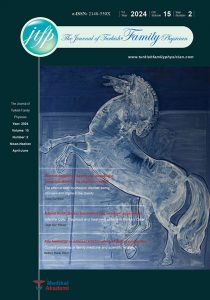The Determination of knowledge level of family physicians for frailty; A Cross-sectional study
Introduction: Frailty syndrome, which affects the quality of life negatively in patients of 65 years old and over, can be observed from physical inactivity to immobility, and can affect cognitive disorders. General symptoms of frailty are; slowing walking speed, involuntary weight loss, decreased appetite, decreased body mass index (BMI), decreased muscle strength, feeling insufficient while doing physical activity, weakness, fatigue, impaired cognitive functions, and memory loss. Fragility is reversible, but if it is not noticed earlier it can progress to immobility or death. Comprehensive Geriatric Assessment (CGA) is important in detecting a frail elderly. The aim of the study is to determine the knowledge level of family physicians in Erzincan.
Methods: This is a cross-sectional study. It is aimed to reach at least 80% of family physicians (FPs) employed actively in 73 primary care units in Erzincan. The researchers applied questionnaire face-to-face to the participants. Erzincan Clinical Research Ethics Committee approval was received for the study. SPSS 23 statistics program was used for data analysis.
Results: The frailty questionnaire was applied to 58 FPs. Only 12.1% of FPs correctly answered the question of which word first comes to mind for ‘frailty’. The 74.1% (n: 43) of participants did not consider themselves sufficient for CGA, and 70.7% (n: 41) of participants wanted training on CGA. The answer for question if they evaluate the patients for frailty in homecare visits was yes in 38.2%.
Conclusion: It can be said that the ‘frailty’ knowledge level of FPs should be increased in Erzincan. In light of the data obtained, it may be suggested to organize “frailty” and CGA trainings for family physicians. Frailty and CGA should be included in undergraduate medical education and continuous trainings of FPs.
References
- TUİK: İstatistiklerle yaşlılar, 2019. https://data.tuik.gov.tr/Bulten/Index?p=Istatistiklerle-Yaslilar-2019-33712 adresinden 11/11/2020 tarihinde erişilmiştir.
- Koç İ, Özgören A, Şirin H. Türkiye’de yaşlıların yaşam kalitesi ve aile yapısının yaşlıların yaşam kalitesine etkisi. Türkiye’de Doğurganlık, Üreme Sağlığı ve Yaşlılık, Türkiye Nüfus ve Sağlık Araştırması 2008 İleri Analiz Çalışması’nda. Ankara, Hacettepe Üniversitesi Nüfus Etütleri Enstitüsü, S.B. Ana Çocuk Sağlığı ve Başbakanlık Devlet Planlama Teşkilatı ve TÜBİTAK. 2010:231-83.
- Hacettepe Üniversitesi Nüfus Etütleri Enstitüsü. 2013 Türkiye Nüfus ve Sağlık Araştırması İleri Analiz Çalışması. Ankara, Hacettepe Üniversitesi Nüfus Etütleri Enstitüsü, T.C. Kalkınma Bakanlığı ve TÜBİTAK. 2013:2-3.
- Yaman H, Yaman A. Aile Hekimliğinde düşkünlük: Tanısı ve yönetimi. Ankara Med J 2015;15(2):89-95.
- Fried LP, Tangen CM, Walston J, Newman AB, Hirsch C, Gottdiener J, et al. Frailty in older adults: evidence for a phenotype. J Gerontol A Biol Sci Med Sci 2001; 56:146-56.
- Keevil VL, Romero-Ortuno R. Ageing well: a review of sarcopenia and frailty. Proceedings of the Nutrition Society 2015; 74:337–47.
- Leheudre MA, Woods AJ, Anton S, Cohen R, Pahor M. Frailty clinical phenotype: a physical and cognitive point of view. Nestle Nutr Inst Workshop Ser 2015; 83:55–63.
- Ng TP, Feng L, Larbi A. Frailty in older persons: Multisystem risk factors and the Frailty Risk Index (FRI). JAMDA 2014;15(9):635-42.
- Barreto PS, Greig C, Ferrandez A. Detecting and categorizing frailty status in older adults using a self-report screening instrument. Archives of Gerontology and Geriatrics 2012;54: 249–54.
- Savaş S, Akçiçek F. Kapsamlı geriatrik değerlendirme. Ege Journal of Medicine 2010;49(3):19-30.
- T.C. Sağlık Bakanlığı Aile Hekimliği Uy. Yönetmeliği. 2016. https://www.mevzuat.gov.tr/mevzuat?MevzuatNo=17051& MevzuatTur=7&MevzuatTertip=5 adresinden 30/04/2020 tarihinde erişilmiştir.
- Gobbens RJ, Luijkx KG, Wijnen-Sponselee MT, Schols JM. Toward a conceptual definition of frail community dwelling older people. Nursing Outlook 2010;58(2):76-86.
- de Vries NM, Staal JB, van Ravensberg CD. Outcome instruments to measure frailty: A systematic review. Ageing Research Reviews 2011; 10(1):104–14.
- Gill TM, Gahbauer EA, Allore HG. The role of intervening hospital admissions on trajectories of disability in the last year of life: prospective cohort study of older people. BMJ 2015;350:h2361.
- Hamilton W, Round J. Identifying frailty in primary care. BMJ 2017;358:j4478.
- Strandberg TE, Pitkala KH. Frailty in elderly people. Lancet 2007;369(9570):1328-9.
- Kapucu S, Ünver G. Kırılgan Yaşlı ve Hemşirelik Bakımı. Osmangazi Tıp Dergisi 2017; 39(1): 122-29.
- İstatistiklerle Yaşlılar-2019. Türkiye İstatistik Kurumu. Resmi İstatistik Portalı. http://www.tuik.gov.tr/PreHaberBultenleri.do?id=33712 adresinden 08/05/2020 tarihinde erişilmiştir.
- Chang C, Chan DC, Kuo KN, Hsuing CA, Chen CY. Prevalence and Correlates of Geriatric Frailty in a Northern Taiwan Community. J Formos Med Assoc 2011;110(4):247-57.
- Aygör H. Edmonton Kırılganlık Ölçeği’nin Türk toplumu için geçerlik ve güvenirliğinin incelenmesi. Ege Üniversitesi Sağlık Bilimleri Enstitüsü, İç Hastalıkları Hemşireliği Anabilim Dalı. Geriatri Hemşireliği Yüksek Lisans Programı Yüksek Lisans Tezi. 2013.
- Çakmur H. Frailty among elderly adults in a rural area of Turkey. Med Sci Monit 2015; 21:1232-42.
- O’Caoimh R, Galluzzo L, Rodríguez-Laso A, Johan Van der Heyden J, Ranhoff AH, Lamprini-Koula M, et al. Prevalence of frailty at population level in European ADVANTAGE Joint Action Member States: a systematic review and meta-analysis. Ann Ist Super Sanità 2018;54(3): 226-38.
- Paulson D, Lichtenberg PA. The Paulson-Lichtenberg Frailty Index: Evidence for a self- report measure of frailty. Aging Ment Health 2015; 19(10): 892–901.
- Ulusal Calısma Grubu ULUSAL CEP-2020. Tıp Fakültesi – Ulusal Çekirdek Eğitim Programı-2020. Tıp Eğitimi Dünyası 2020;19(57):1-146.
- TUKMOS. Aile Hekimliği Çekirdek Eğitim Müfredatı-2019. https://dosyamerkez.saglik.gov.tr/Eklenti/ 34104,ailehekimligimufredatv24pdf.pdf?0 adresinden 08/05/2020 tarihinde erişilmiştir.
- Allen J, Gay B, Crebolder H, Heyrman J, Svab I, Ram P, et al. The European definitions of General Practice / Family Medicine. (Ed.) Evans P. WONCA-Europe 2011 Edition. Barcelona, 2011.



